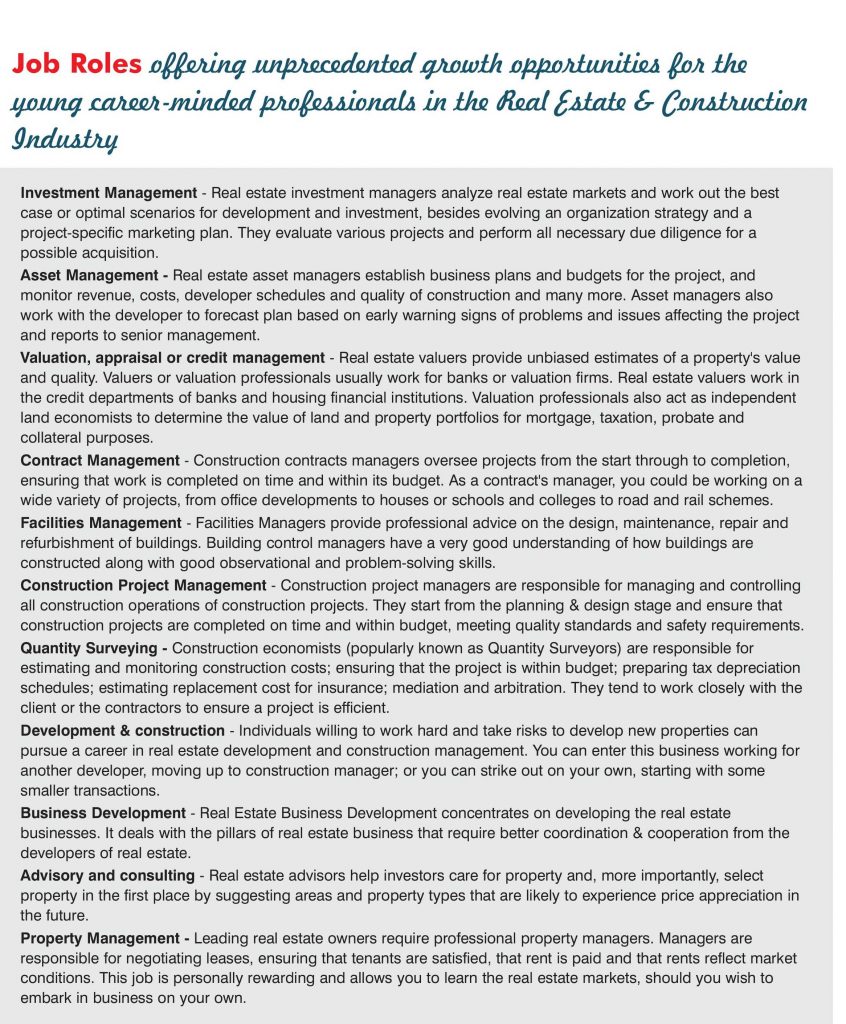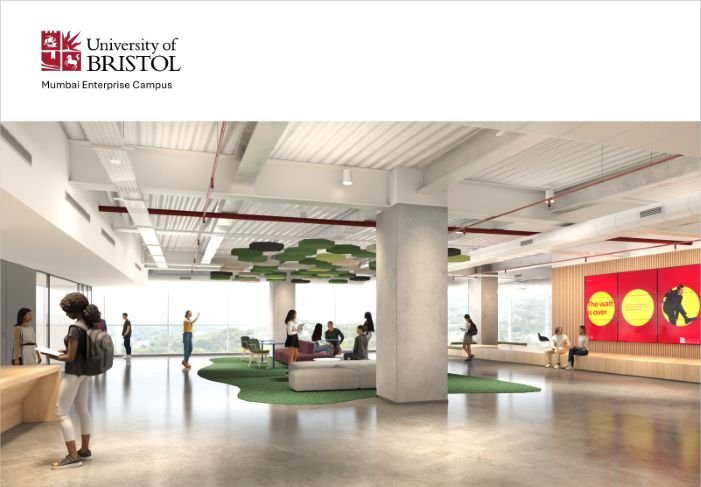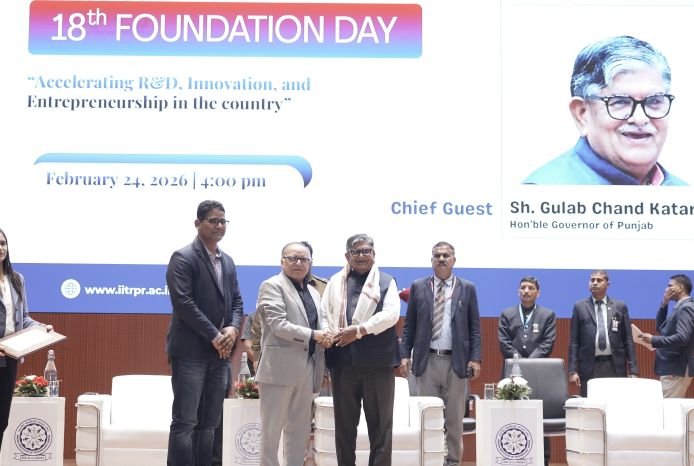

Various data estimates project the requirement of skilled workers and professionals in real estate and construction sector anywhere between 15 million and 66 million in next 2-3 three years. While about 80% of this workforce will constitute semi-skilled personnel, the remaining 20% will be divided between skilled and highly skilled personnel. In India, traditionally the highly skilled professionals for this sector came either from engineering or architectural background as there were no real estate or construction management education courses available in the country. However, in 2013, RICS School of Built Environment, Amity University was set up to address this skills gap and provide professionals who are fit for purpose from the day they join the industry. Ashwani Awasthi, Managing Director, RICS School of Built Environment answers some questions on the trend and offerings from his specialized school to Autar Nehru.

You started in 2013; can you briefly take us through the journey of a few important achievements of your institution to get a sense of important service you have been rendering to real estate & construction industry?
RICS SBE was established in 2013 and is supported by leading real estate, construction & infrastructure firms as well as the Ministry of Urban Development, Government of India. It was set up to meet the huge shortfall of skilled professionals in this sector. I am proud to say that we are well on our way towards achieving that aim. Since its inception the School has enrolled 2500+ students and more than 2000+ trained and qualified alumni of our School are already working in the industry and making us proud by leaving their mark in the corporate world.
We are the only institute in India who has RICS accredited programs.A special feather in our cap has been that we are India’s first and so far,only institute to gain PMI GAC accreditation for our MBA in CPM program. All this ensures that the students are receiving world class education right here in India. I must say we have come a long way in such a short span of time.
In a very short span of time we have established relationships with universities in Asia, UK, Australia and US to build knowledge and thought leadership. We have collaborated with like-minded organizations to create an impact in education, research and thought leadership and the fact that we are now compared with the institutes which have been established almost over 50 years ago, speaks volumesof how far we have come in a very short time. With two fully functional campuses in Noida & Mumbai, we have over 70+ faculty with approx.1000 students currently studying in the campuses, almost over 500+ companies have visited us for recruiting our students.
How much important are RICS and Amity tags for your school?
RICS is the world’s leading self- regulatory global professional body in the field of built and natural environment established in UK in 1868. Our membership of RICS or MRICS as one of the most pre-eminent global qualification in the field of built environment is a statement of quality in itself. So we have built in commitment to maintain exemplary standards and guarantee the highest quality advice and service. Ditto for Amity. Amiity University is one of the leading academic institutions of India, wherein over 95,000 students are pursuing over 240 programs, spread over a total of 1000 acres of campuses. So being part of family is a great feeling. Our founders believe in the principle of nation building through education. They want to transform the nation through education and have started institutions which will groom young future leaders to be complete, value-driven human beings and competent professionals with a deep passion for humanity.
Can you tell our student readers who aspire for a career in real estate and construction, what are broad criteria for the programs that your school offers?
Yes, we do have specific eligibility criteria for each of our programs.
For MBA- We accept the scores of national level management entrance exams like CAT, MAT, XAT etc. The detailed eligibility criteria is:
Minimum 50% marks in Graduation with minimum score of MAT – 500/GMAT – 500 / CMAT – 150 Or percentile in CAT/XAT – 75 / NMAT – 60, Or Amity Written Test on the day of Interview.
For BBA
Student should have passed 10+2 grade with minimum 60% marks.
For Diploma
Graduation (min 50%)
Student should have passed 10+2 grade with minimum 55% marks.
We have a new student intake capacity of 600 combined between the two campuses with Noida having a capacity of 350 while Mumbai 250. 60% of the intake is for construction programs while 40% is for the real estate programs.
In terms of cost and scholarships, how do your programs compare with other programs/standard MBAs?
The cost of pursuing a comparable MBA program in India ranges from INR 15-25 lakhs and if one chooses to go abroad to pursue a similar program than it would cost in the range of INR 70 lakhs -1 Cr depending on the institute and the specialization. In comparison to these our MBA programs are quite cost effective as we allocate large parts of our budget and effort to bring cutting edge resources to our students so that we can provide them with a world class futuristic education that is relevant in their chosen field. We expose and train them in new software, techniques and technology which would be an asset for them in their career and ensure that they are also future ready.
The total cost of 2 years of our MBA programs is 11.90 lakh, for 3-year BBA 9.24 lakh, and for one-year PGDFM program it is 4 lakhs.
We have tie-ups with many national and private banks for provisioning of education loans to students if required. We also have slab-based scholarship programs to support meritorious and needy students.
Interdisciplinary education is being touted as the desirable form of education even in the proposed education policy, you are being part of a university, how much of it applies to your courses. Also, why don’t you offer architecture?
I am in complete agreement with the focus on interdisciplinary education and Amity university provides great opportunity to students through a choice-based curriculum design to pursue interdisciplinary education. However, we started the School of Built Environment to address the skills gap that exists in the industry and our objective was to provide professionals who possess the relevant skills and competencies. Further, even Built Environment itself has various disciplines primarily, construction, real estate and infrastructure. Our programs are designed in a manner where the students have the option to choose interdisciplinary courses through electives, like a student from construction management program can choose courses from real estate program and vice a versa. This helps them achieve a better overall understanding of the other domains and opens more employment avenues as well.
Is architecture also part of this enrichment?
Amity University does offer an architecture program however architecture only deals with the design aspect of the built environment. Our programs are techno-managerial programs that provide knowledge on the technical and management aspects of the built environment, Graduates from architecture and engineering colleges constitute most of our student intake. Our country has number of good architecture colleges and adding more to the list may not help our objective.

What are some other opportunities you are looking at?
There are many professionals who have been working in this sector since several years,but they need to upgrade themselves and be relevant in the current industry which needs skilled professionals. For them to keep abreast of these latest trends and upgrade their skillsRICS is already providing short term distance learning and hybrid programs. We will soon be launching distance learning full-term degree and diploma programs (executive education programs) so that we can provide an in-depth knowledge alongwith the knowledge on the latest software and technologies which will further help professionals to be relevant in their chosen field. We want to reach out to all prospective students and be the end to end learning and development solution in real estate and construction domain.
There has been a slow down in the growth of this sector in the past few years, has this impacted need of professionals and therefore your work?
We are experiencing a slowdown in the world economy and the construction & real estate sector is not insulated from it. However, in India there is skills gap in this sector, and that itself provides a huge employment opportunity for people with relevant skills and competencies. Also, during the slowdown in the economy, the government launched several large infrastructure projects whereby there is a significant demand for construction and real estate professionals. Moreover, construction and real estate will continue to be the second largest employer and will keep creating significant demand for a skilled workforce even in a subdued growth period.
It is predicted that the Indian built environment will be the third-largest industry in the world by 2030. Dependent on a number of metrics like skilled manpower, flexibility and technological advancement, the built environment is transforming the country as India’s real estate sector is expected to contribute 13 percent to the country’s gross domestic product (GDP) by 2025 and the market size is expected to be $1 trillion by 2030.With an estimated yearly growth of 7-8 per cent, it is poised to create ample employment opportunities for future generations.
Construction sector like any other economic sector is impacted by technological disruption. Any thoughts on that?
The industry is moving towards its version 4.0 which is a move towards greater digitization. As a part of this move, the industry is looking at widespread adoption of prefabrication, automation, 3D printing, machine learning, virtual reality, drones, sensors, robots for repetitive or hazardous processes and lots of data to help know itself better and to shape the decisions it makes today and tomorrow. Civil engineering earlier considered to be a slow-motion discipline has acquired unparalleled growth dimensions with advance and disruptive technologies transforming and driving the industry to the future. Adoption of these new technologies have transformed the way we design, build and manage real estate.
It is important for us to see the disruptors coming and quickly adapt to them. At the RICS School of Built Environment, Amity University, we identified that change must come not just from the employers within the sector, but even educational stakeholders. Keeping that vision in mind, we launched Education 4.0 where our students are not only exposed to new age technologies like AI, Big Data, IOT, Cloud Computing,BIM etc. but are also taught to be flexible and adaptive to the business environment and sensitive to respond to challenges.








